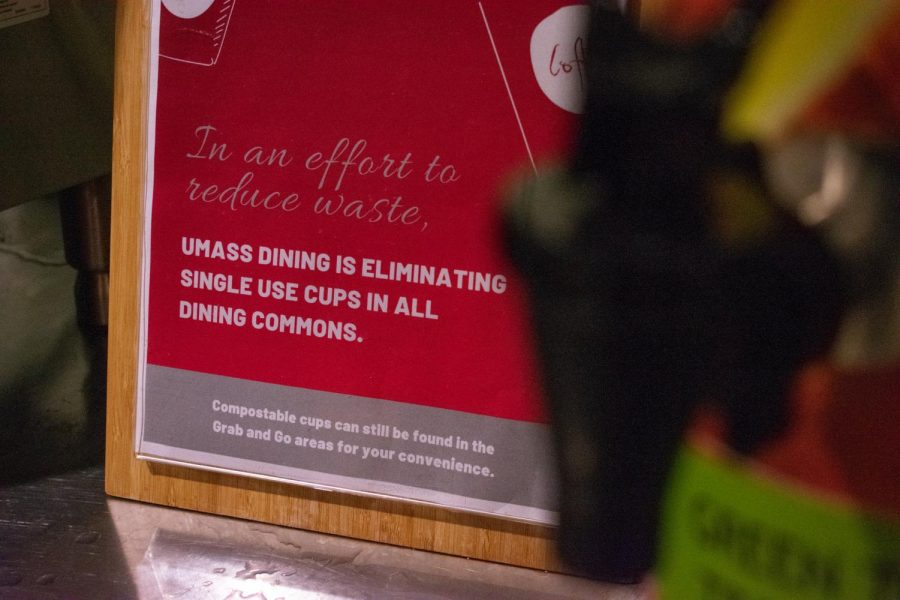Outrage. Shock. Indignation.
These are just three words to describe the reaction that some students at the University of Massachusetts had upon seeing signs in the dining halls that read, “In an effort to reduce waste, UMass Dining is eliminating single use cups in all Dining Commons.” News of this container catastrophe spread on social media, specifically in the Facebook group “UMass Memes for Second Tier Tweens,” where UMass student Duy Le posted a meme that featured one of the dining hall signs. Comments under the post displayed students’ frustration. Julien Olsen wrote “More money, less stuff. Thanks,” while Alexander Clifford commented, “[T]hey really are looking to lose that #1 Dining title, huh?”
Another member of the Facebook group, Arnesh Sengupta, however, took a contrarian point of view. He wrote, “Unpopular opinion: this is a good thing.” While certainly not in line with how many students feel, we agree. UMass Dining’s removal of single-use cups is a necessary move.
Before they were removed, students used single use cups, or to-go cups, as they are more commonly known, to take not only coffee but also food to go. UMass Dining’s policy for taking food out of the dining commons states that “In general food from the dining commons should only be consumed while in the dining room.” Their policy also notes that “an apple, cookie, ice cream cone or a drink in your UMass Dining Bottle is fine” to take out of the dining halls. Students, however, often want to take sandwiches, pizza and other food to go, and to-go cups let students circumvent UMass Dining’s policy.
While to-go cups were useful and compostable, they still were wasteful uses of resources that could be replaced by washable to-go containers, like Tupperware.
The United States goes through 58 billion paper cups annually, and to put that into better perspective, every four cups are responsible for creating one pound of carbon dioxide emission. Most cups, even varieties of compostable cups, are coated with plastic and can’t be recycled. The failure to create a completely compostable and recyclable cup is only a small fraction of the issue.
MIT professor and systems expert Peter Senge spoke on the cup conundrum during a presentation,describing the popularized varieties of compostable cups as “happy cups” because they make people feel good about using them one time, even though those cups are unlikely to end up in a compost facility. Compostable cups seem like a good idea on paper; however, they still foster a one-use, one-time convenience culture. In order to actually create less waste in an unsustainable throwaway culture and on a college campus, UMass dining is going to have to eliminate or work to evolve throwaway culture.
Students’ outpouring of discontent following the removal of to-go cups suggests that similar environmental efforts may be met with much resistance in the future. A report issued this past October by the Intergovernmental Panel on Climate Change details a bleak future of dying coral reefs, worsening food insecurity and worsening wildfires as soon as 2040. In the wake of rising environmental issues, the least students can do is become familiar with the idea that our convenience-centric way of living is going to need to be adapted.
Compostable cups are not ideal, and we as a society need to embrace a more sustainable lifestyle, but students also need to be able to take their food on the go. That is why to-go cups should be replaced with a more lenient policy for taking food out of the dining commons. Students should not only be allowed to take food out in washable to-go containers like Tupperware, they should be encouraged to do so by signs in the dining halls.
By eliminating cups in the dining commons, UMass Dining is working to mitigate rising environmental issues. But UMass Dining also needs to recognize that students need to bring food with them out of the dining halls. For food-insecure students who save dining common food for later, and for students who just want to eat their food on the go, a take-out option is necessary (not just Grab n’ Go, which is only available at certain times). Still, UMass needs to be more sustainable, which means changes to the status quo and no to-go cups to go around.
Joe Frank and Morgan Reppert are Collegian columnists and can be reached at [email protected] and [email protected].




















